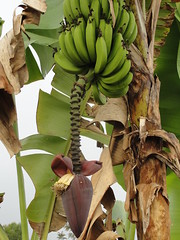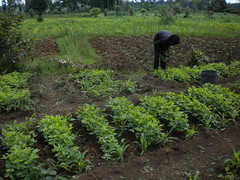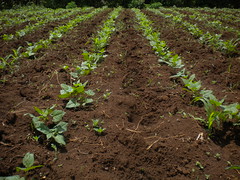It has been a long time since my last post. A whole month has flown by, and it has been wrought with good tidings. My mom came to visit in the middle of October until the first week of November. It was a great vacation for me, and we had lots of adventures. We bicycled through the Rift Valley, observed nature at its finest in the Masai Mara, and sampled the best spices and cuisine in Zanzibar! My mom also got to meet both NGOs I am volunteering with, and many of my Kenyan friends. We had a truly wonderful time.
| Mom drinking ginger with all the Muslim men in Zanzibar |
 The Shiriki farm in Maragua continues to plough forward with
much progress. I have been there several times since my last post, and have
helped prepare the land, plant, dig and harvest. Maize, beans, banana trees, avocado trees, mango trees, cow-peas, sweet
potatoes, irish potatoes, pumpkin, watermelon, arrowroot, yams and sugarcane
have all been planted and have sprouted from the earth. We have also contacted
our local organic farming magazine “The Organic Farmer”, and an extension
officer has visited the farm. He educated all the volunteers on land use
efficiency, making organic fertilizer, planting methods, and natural
pesticides. Shiriki is hoping to form a long term partnership with the Organic
Farmer, and have already talked about using the Maragua farm as a demonstration
site where workshops, education and training can be held for local farmers. In
addition, their website is now live, as is their blog. We are hoping to forge
more partnerships online through these two mediums. Already people seem to be
responding positively, and we have been interacting with individuals from all
over Africa and Europe.
The Shiriki farm in Maragua continues to plough forward with
much progress. I have been there several times since my last post, and have
helped prepare the land, plant, dig and harvest. Maize, beans, banana trees, avocado trees, mango trees, cow-peas, sweet
potatoes, irish potatoes, pumpkin, watermelon, arrowroot, yams and sugarcane
have all been planted and have sprouted from the earth. We have also contacted
our local organic farming magazine “The Organic Farmer”, and an extension
officer has visited the farm. He educated all the volunteers on land use
efficiency, making organic fertilizer, planting methods, and natural
pesticides. Shiriki is hoping to form a long term partnership with the Organic
Farmer, and have already talked about using the Maragua farm as a demonstration
site where workshops, education and training can be held for local farmers. In
addition, their website is now live, as is their blog. We are hoping to forge
more partnerships online through these two mediums. Already people seem to be
responding positively, and we have been interacting with individuals from all
over Africa and Europe.

In other news, last Saturday, the pre-units (equivalent to kindergarten),
standard 8 (equivalent to grade 8) and form 4 (equivalent to grade 12)
from Soweto Academy graduated. Chris (visionary and founder) made sure to hold a special event for the students to fully
celebrate their accomplishments of finishing school. There were tents,
loudspeakers, music, picture booths, performances, and representatives from
government all present to wish the students well. A curious statement was made at the closing of the graduation ceremony; the Board of Directors wife was giving a closing speech to the secondary school graduates, and she said "Now that you have graduated, you are ready to get married?" And everyone, including her, shouted "NO". Soweto Academy really encourages the girls to follow a set career plan and become the new leaders in Kenya. Not that marriage negates this opportunity; however, traditionally, young marriages for the youth in Kibera result in domestic roles and duties where their capacity building as individuals, and ability to follow their own goals is highly compromised.
To give you a flavour of what it was like, here is are some short videos of two of the performances. The first video is of the students performing a traditional Luo song. The second video is of a skip rope gymnastic performance whereby children were trained by an NGO that is based in Kibera. This NGO trains children who show a natural inclination and talent for gymnastics. I am not sure what other benefits this NGO offers, if the children are given schooling, or they charge for performances; nonetheless, it was a very entertaining crew, and everyone in the audience enjoyed watching their amazing skill.
For my Soweto Academy projects, I have finished a draft proposal to apply for funding to receive computers in the school. The total amount required is more than originally anticipated as they do not only require computers, but the construction of a building, and 5 weeks of training for both the principal and the ICT Tutor. The total amount is approximately 1.3 million Kenyan shillings (equivalent to about $15,000 dollars). Part of Kenya’s Vision 2030 is to move from a developing country to a middle income country and they have set out several pillars and sectors to accomplish same. Information and communication technology makes up a substantial part of the plan. Indeed, investment in girl’s schooling is one of the most powerful ways to address poverty and gender norms. Information and computer technology has been shown to increase both social and economic development in health, education, employment, even culture. Computers can make a significant difference in the future outcome for these girls. I am certain that this is a project worth pursuing, so will continue upwards, and the search for donors continues!
| Bottling tank at Soweto |
| Daniel (Joogan) |
In other areas, I have been privileged to get to know the
youth that live in my neighbourhood, and next to my tutor, they are great
Swahili teachers. Below are some of the faces of my neighborhood youth. The youth sit at the corner of Wanyee road, where I live, and
they hustle (look for work) to find money. Several of these youth have survived on
the streets from a young age. The Kenyan political climate is specifically relevant to these individuals. They are already worried about the upcoming 2012 elections, and it
doesn’t make one too comfortable to know that two of the presidential
candidates are currently being tried at the Hague for inciting violence from
the 2007 post election results. The youth have told me they lost many friends in 2007, some even
saw their peers shot down in the street.
Here is a little background on Kenya's current political climate. Politicians, in Kenya, are some of the wealthiest citizens in the country, where one’s most significant arsenal for political power comes directly from the amount of income at their disposal. The last two presidents have been Kikuyu (who have held power for the last 25 years). If Odinga (the current Prime Minister) and a Luo, is the successor, (and many think he will be) it has been said that he will dismantle the multi-billion business empires built up over the last 25 years by the wealthy Kikuyu political families. It is no wonder an alliance (G7) has been formed in an attempt to stop Odinga from succeeding. This makes one all the more worried about the outcome of the next election. It is a very sad thing that the ones to suffer from this political greed are some of the most disadvantaged members of Kenyan society.
Here is a little background on Kenya's current political climate. Politicians, in Kenya, are some of the wealthiest citizens in the country, where one’s most significant arsenal for political power comes directly from the amount of income at their disposal. The last two presidents have been Kikuyu (who have held power for the last 25 years). If Odinga (the current Prime Minister) and a Luo, is the successor, (and many think he will be) it has been said that he will dismantle the multi-billion business empires built up over the last 25 years by the wealthy Kikuyu political families. It is no wonder an alliance (G7) has been formed in an attempt to stop Odinga from succeeding. This makes one all the more worried about the outcome of the next election. It is a very sad thing that the ones to suffer from this political greed are some of the most disadvantaged members of Kenyan society.
| Rajaab and Shuba |